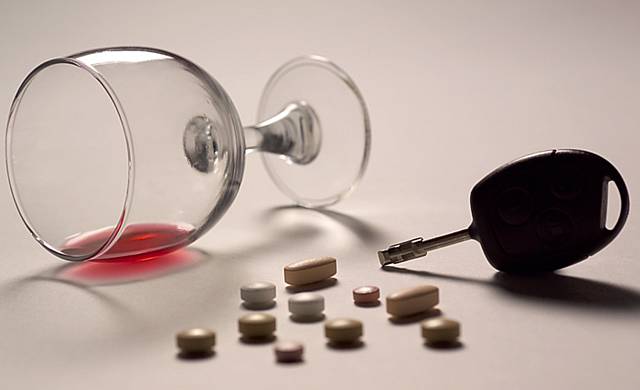Charity appeals to drivers: not a drop, not a drag this festive season, as police crackdown starts
Date published: 02 December 2013
Brake, the road safety charity, is calling on drivers to commit to staying stone cold sober if driving home from xmas festivities - not a drop, not a drag - or plan to get home by taxi or public transport, to prevent devastating casualties. The call comes as the Association of Chief Police Officers' annual drink and drug driving enforcement campaign kicks off. The month long campaign sees forces across England and Wales stepping up checks to catch drivers risking lives.
In 2012, 280 people were killed (one in six road deaths) and 1,210 were seriously injured in crashes involving someone over the limit. It's estimated a further 65 deaths are caused annually by drivers who have been drinking but are under the limit. Drug driving is estimated to cause 200 deaths each year.
Brake is also renewing calls for a zero tolerance drink drive limit, of 20mg alcohol per 100ml blood, in line with evidence that even one drink dramatically increases crash risk, and to send a clear message it should be none for the road. A blood alcohol level of 20-50mg increases your likelihood of crashing three-fold. The current limit is 80mg, but Scotland and Northern Ireland have announced plans to lower their limits to 50mg, which Brake welcomed as a positive step.
Julie Townsend, deputy chief executive, Brake, the road safety charity, said: "As a charity that supports bereaved and injured road crash victims, we witness the suffering that drink and drug driving inflict, and appeal to everyone to help put a stop to it. Drink and drug driving deaths and injuries are cruel and needless, ending and ruining lives and leaving behind traumatised families to pick up the pieces.
"If you're driving home from celebrations this festive season, especially if you're a designated driver, it's vital you take your responsibility for people's safety seriously. It's a proven fact that even small amounts of alcohol or drugs inflate your risk of crashing. So even if you feel okay after a drink, the reality is that if you get behind the wheel you're putting yourself and others in needless danger."
"We are also appealing to the government to take action on drink driving. We have the highest drink-drive limit in Europe, sending out the dreadful message that a drink or two before driving is acceptable. The evidence shows that tougher laws and enforcement would help prevent casualties."
One in six deaths on UK roads are caused by drink drivers over the current legal limit of 80mg alcohol per 100ml blood. Drivers with even 20-50mg alcohol per 100ml of blood are at least three times more likely to die in a crash than those with no alcohol in their blood. This is because even small amounts of alcohol affect drivers' reaction times, judgment and co-ordination. Alcohol also makes it impossible for drivers to assess their own impairment because it creates a false sense of confidence and means drivers are more inclined to take risks and believe they are in control when they are not.
While governments in Northern Ireland and Scotland are making moves to tackle drink driving through committing to reduce their drink drive limits, decision-makers in Westminster rejected recommendations for a lower limit in the North Report into drink and drug driving and Transport Select Committee inquiry into the issue. We now have the highest drink drive limit in Europe, alongside Malta. Evidence is clear that lowering drink drive limits results in fewer casualties, even reducing ‘high-level' drink driving.
Brake calls on drivers to never drive after drinking any amount of alcohol - not a drop - and appeals to everyone to look out for friends and family by speaking out against drink driving.
There are plenty of alternatives to driving if you want to have a drink. Plan ahead for how you will get home by walking (if there's a safe route), taking public transport or booking a taxi. If you need to drive then decide on a designated driver who doesn't drink any alcohol at all, and make sure they stick to this.
Driving after drinking alcohol significantly increases your risk of crashing, potentially killing or injuring yourself, you passengers or someone else. Even if you feel sober after one drink, your reaction times will have slowed and your crash risk increased.
Don't drink if you are driving early the next morning. There's no way of knowing exactly how long it takes to sober up completely after drinking, but it's longer than many people think. As a rough guide you should allow one hour to absorb alcohol, plus at least one hour for each unit consumed - but it could take longer, so you should always leave extra time to be safe. If you've had a lot to drink you may be impaired for all of the following day.
Brake is calling on members of the public to play their part in making roads safer by signing Brake's Pledge at www.brake.org.uk/pledge, to make a personal commitment to use roads safely and sustainably, and help reduce the lives lost needlessly on our roads.
Do you have a story for us?
Let us know by emailing news@rochdaleonline.co.uk
All contact will be treated in confidence.
Most Viewed News Stories
- 1Art exhibitions to celebrate the UN International Year of Co-operation
- 2Schools in Rochdale borough to become vape free settings
- 3Final phase of Rochdale Town Hall redevelopment tabled
- 4Historic England ‘disappointed’ by the spat over Hopwood Hall
- 5Innovative wastewater management system deployed for Littleborough flood defence works
To contact the Rochdale Online news desk, email news@rochdaleonline.co.uk or visit our news submission page.
To get the latest news on your desktop or mobile, follow Rochdale Online on Twitter and Facebook.


